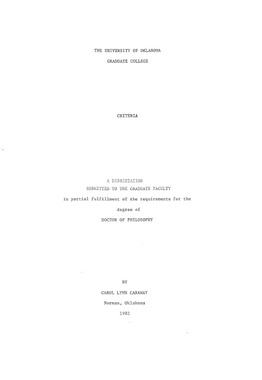| dc.contributor.author | Caraway, Carol Lynn, | en_US |
| dc.date.accessioned | 2013-08-16T12:28:34Z | |
| dc.date.available | 2013-08-16T12:28:34Z | |
| dc.date.issued | 1982 | en_US |
| dc.identifier.uri | https://hdl.handle.net/11244/4995 | |
| dc.description.abstract | The dissertation examines Wittgenstein's view of the relationship between criteria and what they are criteria of. Although it is clear that Wittgenstein thinks a criterion provides a ground for what it is a criterion of, it is unclear what sort of ground he thinks it provides. A Wittgensteinian criterion does not entail that for which it is a criterion, nor does it provide the simple sort of inductive evidence provided by a symptom. | en_US |
| dc.description.abstract | On my interpretation, Wittgenstein's criterial relationship links semantics and epistemology in that the meaning of a term is given by stating its justification conditions or criteria. If B stands for a particular type of behavior and P for a certain psychological state, event, or process, Wittgenstein's criterial relationship states: in certain general circumstances, it is a rule of language that in certain particular circumstances, B is a criterion of P and that in normal particular circumstances, someone's exhibiting criteria of P shows us that (or justifies our assertion or claim to know that) he is in P. | en_US |
| dc.description.abstract | The criterial relationship is a three-term relation between criteria, what they are criteria of, and the circumstances in which criteria obtain. These circumstances are of two kinds: the relevant general facts of nature, which provide the necessary background for the significant functioning of our criteria, and the circumstances of the particular case, which determine both whether behavior functions as a criterion for someone's being in a certain psychological state and whether behavior that is so functioning shows us that the person exhibiting it is in the state in question. | en_US |
| dc.description.abstract | Criteria are connected to family resemblances in that the criteria for a family-resemblance term are identical to the characteristic features that form the family resemblances among the term's referents. Consequently, a general term may have several criteria which need be neither necessary nor sufficient conditions for its application and which may be mutually exclusive and overlap and criss-cross. | en_US |
| dc.description.abstract | Wittgenstein's criterial rules of language are conventional in that they are based on a consensus in judgements. We agree in taking certain natural types of behavior as criteria for certain psychological states, events, and processes. Our agreement developed from and depends upon primitive reactions. Like them, it can be given no rational foundation. Our criterial rules of language are necessary, but their necessity is relative to our particular grammar. Indeed, both what is logically necessary for us and what is logically possible for us are determined by our particular grammar and presuppose certain general facts. | en_US |
| dc.format.extent | v, 242 leaves ; | en_US |
| dc.subject | Philosophy. | en_US |
| dc.title | Criteria. | en_US |
| dc.type | Thesis | en_US |
| dc.thesis.degree | Ph.D. | en_US |
| dc.thesis.degreeDiscipline | Department of Philosophy | en_US |
| dc.note | Source: Dissertation Abstracts International, Volume: 43-05, Section: A, page: 1572. | en_US |
| ou.identifier | (UMI)AAI8224188 | en_US |
| ou.group | College of Arts and Sciences::Department of Philosophy | |
